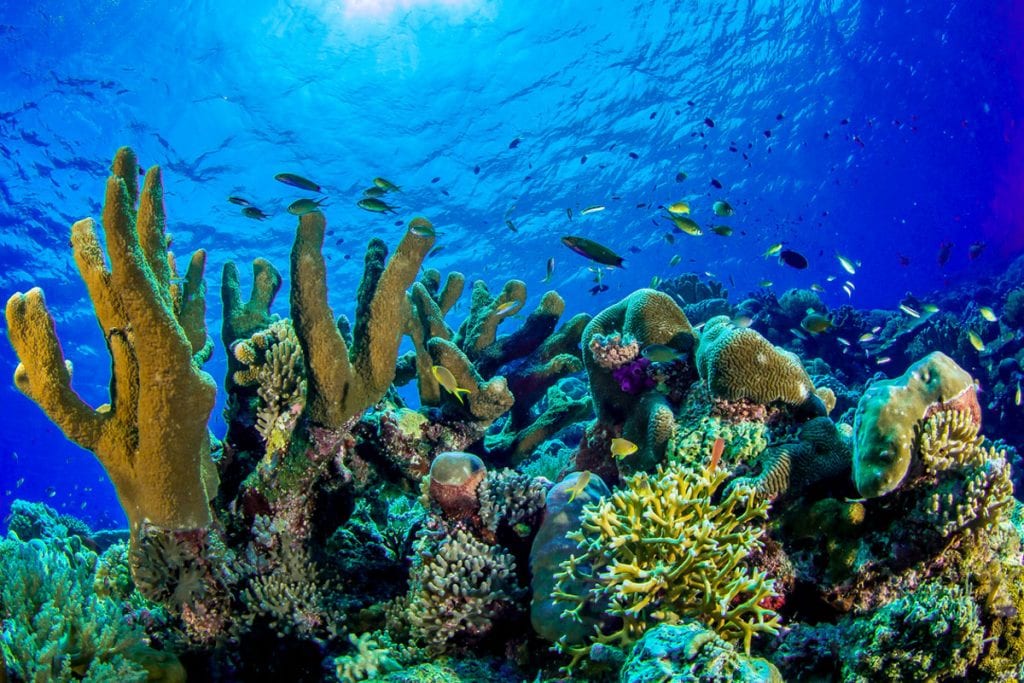UCF Research Impact: U.S. Virgin Islands Ban Harmful Sunscreens

BY ZENAIDA GONZALEZ KOTALA
The U.S. Virgin Islands Tuesday became the first American jurisdiction to ban sunscreens containing oxybenzone and octinoxate effective Dec. 31, to help restore its coral reefs and marine ecosystems.
Hawaii and Key West, Florida, passed bans that go into effect next year but they don’t go as far as this legislation, which bans importing sunscreens with the ingredients beginning Dec. 31, bans the sale or distribution of these sunscreens after March 30, 2020, and prohibits transporting them into or possessing them after Jan. 1, 2021. First-time violators can be fined $1,000, the same fine enacted previously by the Pacific island nation of Palau which adopted a similar bill.
UCF Associate Professor of biology John E. Fauth was part of the international team whose 2015 study spurred the bans. Their experiments demonstrated that oxybenzone caused corals to bleach, which is a major cause of coral mortality worldwide. Oxybenzone also damaged coral DNA and deformed coral larvae. The team’s study has been recognized as among the most impactful research products of the past four years, and is available in the National Oceanic and Atmospheric Administration Institutional Repository.
“It’s good to see our research making an impact to safeguard our natural resources under water,” Fauth said. “Not only will coral reefs have an opportunity to recover, but this also makes sense because so many places rely on natural resources as part of their economy. More than 2 million visit the U.S. Virgin Islands each year and frequent the famous reefs. This is a good step toward protecting the natural treasure and the islands’ economic livelihood.”
The study was motivated by an investigation 10 years before to determine why corals were declining on St. Johns, one of the Virgin Islands. Fauth was involved in that study as well. After sampling corals at Trunk Bay, which has an underwater trail through a coral reef, an employee of a local ecotourism company mentioned that the quiet beach would soon be inundated by hundreds of tourists visiting from the weekly cruise ships, and that a sheen of sunscreen would cover the bay. Fauth and his colleague Craig Downs, now the executive director of Haereticus Environmental Laboratory, stayed and observed a disturbing scene: hundreds of tourists, slathered in sunscreen, began snorkeling and kicking corals, and even standing on coral colonies. The researchers’ 2011 publication states that “levels of oxybenzophenones at this site between 90 parts per billion and 1 part per million were detected in the water column …, raising the possibility that the cellular stress responses in corals at this site could be the result of benzophenone exposure.”
“The Virgin Islands is a popular tourism destination because of its beautiful countryside and warm and friendly people,” Downs said. “ Unfortunately, it also susceptible to the impacts of overtourism and unmanaged tourism, which has been shown around the world to be a devastating threat to coral reefs, as well as to the tourism industry that depends on them. Sunscreen pollution, and especially the chemicals of oxybenzone, octocrylene, and octinoxate, can poison coral reefs so that a next generation of corals and fish can never be established, ultimately giving rise to ruined seascape. The people, the tourism industry, and elected representatives of the Virgin Islands have taken an audacious measure to reduce the destructive aspects of sunscreen pollution and to conserve and restore their coral reefs.”
Instead of using sunscreens containing oxybenzone, octinoxate and other chemical ingredients, the U.S. National Park Service advises visitors to seek shade, wear protective clothing such as hats, long-sleeved rash guards and dive skins, and to use sunscreens that instead contain the mineral ingredients zinc oxide and titanium dioxide. The U.S. Food and Drug administration lists zinc oxide and titanium dioxide as generally regarded as safe and effective. The FDA has not determined that oxybenzone and octinoxate are safe and is soliciting written comments on this question. The 10-member Association of Southeast Asian Nations requires that any sunscreen containing oxybenzone have a warning printed on the label.
Since the studies were released, more countries have been looking at the impact of these chemicals on their reefs.
UCF Rosen School of Hospitality Management Professors Kelly Semrad, Robertico Croes and Manuel Rivera used the information from Fauth’s studies in developing a sustainable-tourism plan for the Caribbean island of Bonaire. Bonaire and Aruba also banned sunscreens containing oxybenzone and octinoxate effective in 2021.
Fauth joined UCF in 2003. He has a Ph.D. in zoology from Duke University and a B.S. in biology and chemistry from St. Lawrence University. He has written more than 40 articles and book chapters, and recently conducted two webinars for Florida’s Department of Environmental Protection about how chemical sunscreens harm corals. Fauth also is a member of UCF’s Sustainable Coastal Systems Cluster.
